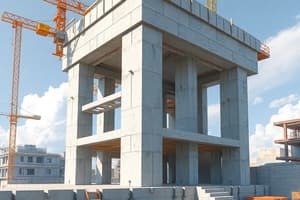Podcast
Questions and Answers
The most common spread footing consists of a rectangular or square slab of constant thickness. Reinforcing bars are placed near the bottom of the footing and run in what direction?
The most common spread footing consists of a rectangular or square slab of constant thickness. Reinforcing bars are placed near the bottom of the footing and run in what direction?
In both directions
According to the American Concrete Institute, the design load for an elevated slab formwork is the dead load of the slab plus a construction live load allowance of how many pounds per square foot (lbs/ft²)?
According to the American Concrete Institute, the design load for an elevated slab formwork is the dead load of the slab plus a construction live load allowance of how many pounds per square foot (lbs/ft²)?
50
Control tests for slump, air content, compressive strength, and yield should conform to what?
Control tests for slump, air content, compressive strength, and yield should conform to what?
The appropriate ASTM specifications
Too much air in concrete does what to the concrete?
Too much air in concrete does what to the concrete?
What design procedure allows for the anticipated downward deflection of formwork when the concrete fills the form?
What design procedure allows for the anticipated downward deflection of formwork when the concrete fills the form?
What is the best type of nail to use for nailing bracing and forms when the nails must be removed when the pour is completed?
What is the best type of nail to use for nailing bracing and forms when the nails must be removed when the pour is completed?
What is the best way to reduce lateral pressure on concrete forms when placing concrete?
What is the best way to reduce lateral pressure on concrete forms when placing concrete?
What should be added to concrete in cold weather?
What should be added to concrete in cold weather?
What will be the effect of lightly dampening the subgrade before placing the concrete?
What will be the effect of lightly dampening the subgrade before placing the concrete?
When working with hot concrete what admixture is used to cool concrete that contains too much water?
When working with hot concrete what admixture is used to cool concrete that contains too much water?
Which admixture BEST allows for properly finishing a fresh load of concrete that has a high temperature?
Which admixture BEST allows for properly finishing a fresh load of concrete that has a high temperature?
Which of the following is NOT a reason to use an admixture?
Which of the following is NOT a reason to use an admixture?
According to the American Concrete Institute, what is the effect of temperature on the finishing time of concrete?
According to the American Concrete Institute, what is the effect of temperature on the finishing time of concrete?
Laminated fiber form use for columns should be braced if over what height?
Laminated fiber form use for columns should be braced if over what height?
High-range water-reducing admixtures are also known as what?
High-range water-reducing admixtures are also known as what?
What temperature does cold-weather concreting need to be performed when the mean daily temperature is below or expected to fall below?
What temperature does cold-weather concreting need to be performed when the mean daily temperature is below or expected to fall below?
What type of forms provide good reuse of equipment, larger concrete placements, and decreased erection time?
What type of forms provide good reuse of equipment, larger concrete placements, and decreased erection time?
What would be the depth of the control joint for a slab that is five inches thick?
What would be the depth of the control joint for a slab that is five inches thick?
Flashcards
Where do reinforcing bars run in a spread footing?
Where do reinforcing bars run in a spread footing?
The reinforcing bars run parallel to the length of the footing and are typically placed at the bottom for maximum support.
Construction live load allowance for elevated slab formwork
Construction live load allowance for elevated slab formwork
According to the American Concrete Institute, the design load for an elevated slab formwork includes the weight of the slab itself plus an additional allowance of 50 lbs per square foot (lbs/ft²) for construction activities.
Standards for control tests
Standards for control tests
Control tests for slump, air content, compressive strength, and yield should conform to the established standards and specifications outlined by the American Concrete Institute (ACI) and other relevant industry codes.
What does too much air do to concrete?
What does too much air do to concrete?
Signup and view all the flashcards
Deflection allowance in formwork design
Deflection allowance in formwork design
Signup and view all the flashcards
Best nail for formwork bracing
Best nail for formwork bracing
Signup and view all the flashcards
How to reduce lateral pressure on concrete forms
How to reduce lateral pressure on concrete forms
Signup and view all the flashcards
What is added to concrete in cold weather?
What is added to concrete in cold weather?
Signup and view all the flashcards
Effect of dampening the subgrade
Effect of dampening the subgrade
Signup and view all the flashcards
What is used to cool hot concrete?
What is used to cool hot concrete?
Signup and view all the flashcards
Best admixture for finishing high-temperature concrete
Best admixture for finishing high-temperature concrete
Signup and view all the flashcards
Reason NOT to use an admixture
Reason NOT to use an admixture
Signup and view all the flashcards
Effect of temperature on finishing time
Effect of temperature on finishing time
Signup and view all the flashcards
When to brace laminated fiber forms
When to brace laminated fiber forms
Signup and view all the flashcards
Another name for high-range water-reducing admixtures
Another name for high-range water-reducing admixtures
Signup and view all the flashcards
Temperature requirement for cold weather concreting
Temperature requirement for cold weather concreting
Signup and view all the flashcards
Advantages of slip forms
Advantages of slip forms
Signup and view all the flashcards
Depth of control joint for a 5-inch slab
Depth of control joint for a 5-inch slab
Signup and view all the flashcards
What is the effect of concrete being cast below 40 degrees Fahrenheit?
What is the effect of concrete being cast below 40 degrees Fahrenheit?
Signup and view all the flashcards
How does too much air affect concrete density?
How does too much air affect concrete density?
Signup and view all the flashcards
What is a slump test?
What is a slump test?
Signup and view all the flashcards
What affects concrete compressive strength?
What affects concrete compressive strength?
Signup and view all the flashcards
What is the purpose of control joints in concrete?
What is the purpose of control joints in concrete?
Signup and view all the flashcards
Why is calcium chloride avoided in concrete?
Why is calcium chloride avoided in concrete?
Signup and view all the flashcards
Study Notes
Concrete Footing Design
- Common spread footings are rectangular or square slabs of consistent thickness
- Reinforcing bars are placed near the bottom and run in both directions
- Design load for elevated slab formwork includes slab dead load plus 50 lbs/ft² construction live load allowance
Concrete Slump and Air Content
- Slump, air content, compressive strength, and yield should follow appropriate ASTM specifications
- Excessive air content weakens concrete and reduces durability
Formwork Deflection
- Camber design procedure accounts for anticipated formwork deflection during concrete filling
Nail Types for Formwork
- Double-headed or duplex nails are best for bracing and formwork removal after pouring
Concrete Placement and Pressure
- Slower placement reduces lateral pressure on concrete forms
Cold Weather Concrete Additives
- Calcium chloride is added to concrete in cold weather
Subgrade Dampening Before Concrete Placement
- Lightly dampening the subgrade prevents rapid water extraction from the concrete
Concrete Admixtures for Temperature Control
- Fly ash is used as an admixture to cool hot concrete with excessive water
- Retarder admixtures are used for finishing high-temperature concrete
Concrete Temperature Effects on Finishing Time
- 20°F increase in concrete temperature reduces finishing time by 50%
Laminated Fiber Form Bracing
- Laminated fiber forms for columns should be braced if exceeding 15 feet in height
High-Range Water-Reducing Admixtures
- High-range water-reducing admixtures are also known as superplasticizers
Cold Weather Concreting Temperatures
- Cold weather concreting should be performed when mean daily temperature is 40°F or below.
Form Types for Large Placements
- Gang forms provide good reuse, larger placements, and faster erection
Control Joint Depth for Slabs
- Control joint depth for 5-inch thick slabs should be 1.25 inches or minimum of 1 inch
Studying That Suits You
Use AI to generate personalized quizzes and flashcards to suit your learning preferences.
Related Documents
Description
This quiz covers essential topics in concrete design such as footing types, slump specifications, and formwork considerations. Additionally, it addresses best practices for concrete placement and the use of additives in cold weather. Test your knowledge on these critical aspects of concrete engineering and construction.



